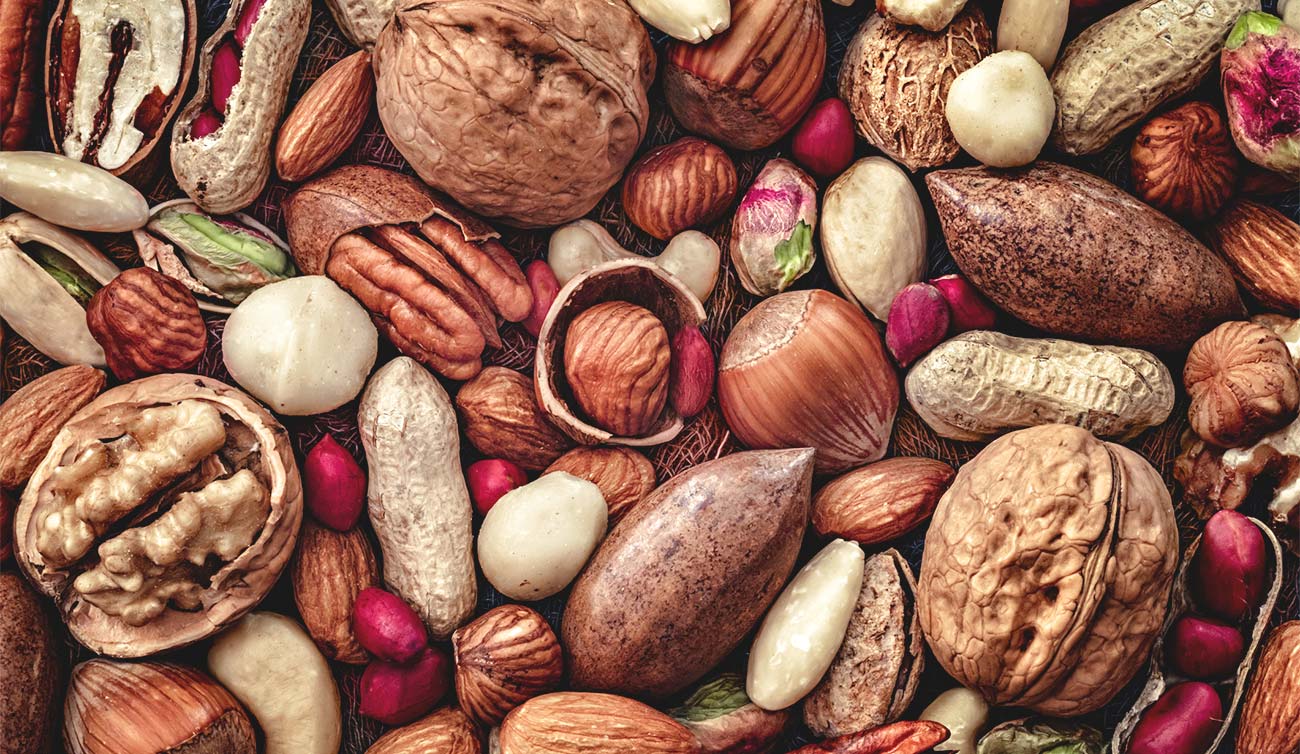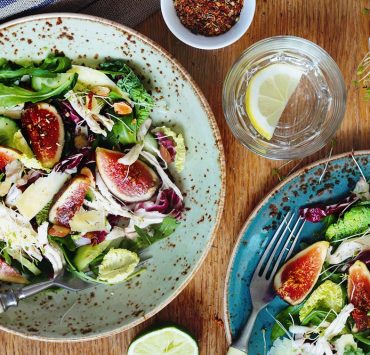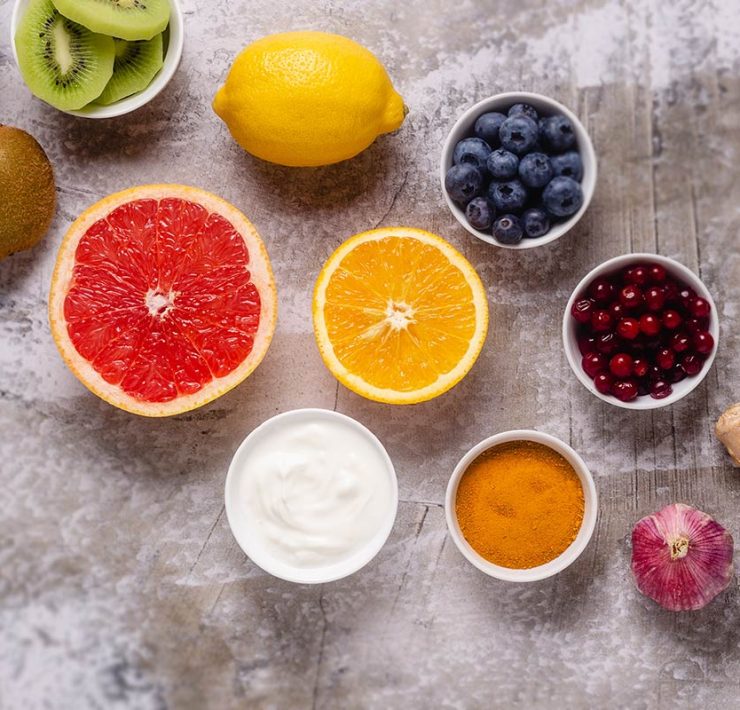Nuts are truly a gift from nature: A delicious snack grown in perfect bite-sized proportions that also happen to be packed with protein, nutrients, and minerals that help reduce the risk of conditions like heart disease and support a healthy body weight! You can get ’em everywhere, whether you want to pop them as a go-to snack or incorporate them into one of countless delicious recipes from salad dressings to crusted meats to tasty desserts.
What makes these morsels such superfoods? Here’s everything you need to know about the 10 most nutritious nuts to nosh on—and the powers they contain.
Almonds
Almonds hold one of the most impressive nutrient profiles among nuts. They are a great source of Vitamin E, which works as an antioxidant to protect the cells against oxidative damage. They are also loaded with fiber and heart-friendly monounsaturated fats that help manage cholesterol levels for a healthy heart. Almonds have the highest calcium content of a nut, a nutrient essential for strengthening our bones, nerves and muscle function.
Try not to peel them! The skin promotes the growth of beneficial strains of bacteria like Lactobacillus and is packed with flavonoids that have antioxidant benefits.
Calories: A 1-ounce serving of 23 nuts contains about 165 calories.
Try this recipe: Moroccan chicken tagine with apricots and almonds
Walnuts
Walnuts, with their peculiar brain-like shape, are coherently known as the top nut for brain health! Multiple human and animal studies suggest that eating one to two ounces daily can reduce LDL (bad) cholesterol and elevated blood pressure and therefore reduce the risk of factors for dementia like heart disease and type 2 diabetes. They are high in good fats a.k.a polyunsaturated fats and have the highest content of omega-3 essential fatty acids and alpha lipoic acid (ALA) among all edible plants. An essential addition to those of you following a plant-based diet!
In addition, animal studies reveal that the antioxidant content of walnuts, which is richer than any other nut, may be useful in fighting against cancers like colon and breast cancer.
A 1-ounce serving of 7 whole shelled walnuts contains 185 calories.
Try this recipe: Pear, gorgonzola, and walnut salad
Pistachios
If you’re looking for a low-calorie filling snack, these green nuts are a go-to, and also have a lower fat content than other nuts. Pistachios are rich in potassium and phytosterols which strengthen cardiovascular health. They are also an excellent source of vitamin B6 which the body needs for blood sugar regulation, immune function and more. Research shows that pistachios may improve blood pressure levels, weight loss efforts and oxidative status as their reasonable levels of lutein and zeaxanthin provide anti-inflammatory and antioxidant benefits.
A 1-ounce serving of 49 pistachios contains around 159 calories.
Try this recipe: Mini knafeh cakes with rose and pistachio
Pecans
Heart-friendly pecans are rich in vitamins, minerals, healthy fats and fiber. They are packed with plant sterols that effectively lower cholesterol levels. They are a good source of zinc which is key for immune function, DNA synthesis, wound healing and more. Research suggests that pecans benefit heart health as they are rich in antioxidants, which helps prevent plaque formation that leads to the hardening of arteries. They are also a good source of oleic acid (a monounsaturated fat) which is known to be the key element of the heart-healthy benefits of avocados and olives.
A 1-ounce serving of 15 pecan halves contains around 196 calories.
Try this recipe: Vegan squash & spinach fusilli with pecans
Cashews
This crunchy and creamy nut offers a good amount of protein and is a useful source of vitamin K and magnesium, all of which are essential for bone health. The magnesium content is also thought to delay age-related memory loss. Cashews are a good source of heart-friendly monounsaturated fats and supply plant sterols which may help manage cholesterol levels.
Studies suggest that diets high in cashews support heart health by lowering blood pressure and improving blood lipid levels which help improve symptoms of metabolic syndrome (like blood fat levels, blood sugar etc.) that affect your risk of heart disease and diabetes.
A 1-ounce serving of 18 cashews contains around 157 calories.
Try this recipe: Sweet and spicy roasted cashews
Peanuts
Okay, so this may be cheating, since this perennial snack item is technically a legume (AKA a bean). Nevertheless, the sneaky peanut’s nutritional profile, health benefits, and culinary use is very similar to that of a tree nut, so we welcome it to the list!
Protein-rich peanuts are an easily available and uncostly addition to your diet. They provide several essential nutrients and are particularly recommended for pregnant women for being a source of folate, a B vitamin that significantly aids in placental and fetal development.
They also contain a range of antioxidants, polyphenols, amino acids and flavonoids.
Research suggests that the regular intake of peanuts may be associated with a lower risk of type 2 diabetes and death.
A 1-ounce serving of 35 peanuts contains around 161 calories.
Try this recipe: Vegetarian pad Thai
Macadamia Nuts
This tree nut is the richest nut source of monounsaturated fats and therefore helps reduce LDL cholesterol, triglycerides, and blood sugar levels – reducing the risks of heart disease. They are a good source of the minerals magnesium, potassium and calcium and are loaded with fiber.
Although they are known for their high fat content, they are lower in carbohydrates than many nuts and therefore a very popular addition to low carb diets.
A 1-ounce serving of 12 Macadamia nuts contains around 200 calories.
Try this recipe: Macadamia ice cream & mango sorbet swirl pie
Brazil Nuts
Originated from a tree found in the Amazon, Brazil nuts are one of the richest dietary sources of the mineral selenium, which your body needs for critical functions like thyroid hormone production and DNA synthesis. This mineral also functions as a powerful antioxidant and may protect against oxidative damage. Take note: a few nuts a day will be sufficient and you should avoid exceeding the higher limit of 400 mcg, which can lead to selenium poisoning.
They are also high in vitamin E, the polyphenols ellagic and gallic acid, and magnesium which is essential in nerve function, blood sugar regulation, energy production and blood pressure regulation. Brazil nuts also enhance our defense mechanisms.
The recommended serving of 3 Brazil nuts contains around 99 calories.
Try this recipe: Roasted Broccoli with Brazil-Nut Pesto
Hazelnuts
This sweet nut is popularly used in desserts and is loaded with nutrients like vitamin E, manganese, protein, fiber, and healthy fats. They are the second richest nut source of heart-friendly monounsaturated fats and have essential anti-oxidant and anti-inflammatory properties.
Studies show that eating hazelnuts may help reduce elevated LDL cholesterol, total cholesterol and triglyceride levels and therefore help modulate the risk factors of heart disease.
A 1-ounce serving of 12 Hazelnuts contains around 88 calories.
Try this recipe: Hazelnut granola & chia pudding bowls
Chestnuts
Chestnuts are a good source of vitamins, minerals and antioxidants like vitamin B6, potassium and magnesium which help lower the risk of cardiovascular diseases like strokes and heart disease. Some of the antioxidants they contain, like ellagic acid, increase in concentration when cooked. So go ahead and add chestnuts to your favorite dish! They also contain the lowest calories and fat among all the other nuts.
They are a good source of vitamin C when consumed raw and they are high in carbohydrates and fiber, providing 15% of your daily fiber needs in one serving of 10 roasted chestnuts.
A 1-ounce serving of 3 kernels of Roasted Chestnuts contains around 69 calories.
Try this recipe: Porcini and chestnut soup
Go Nuts, People!
Just remember to mind your portion sizes based on your dietary goals—while they’re packed with nutrients and protein, nut are, on the whole, a higher calorie snack. Once ounce per day of your favorite nut or a mix of nuts is the generally recommended amount.






